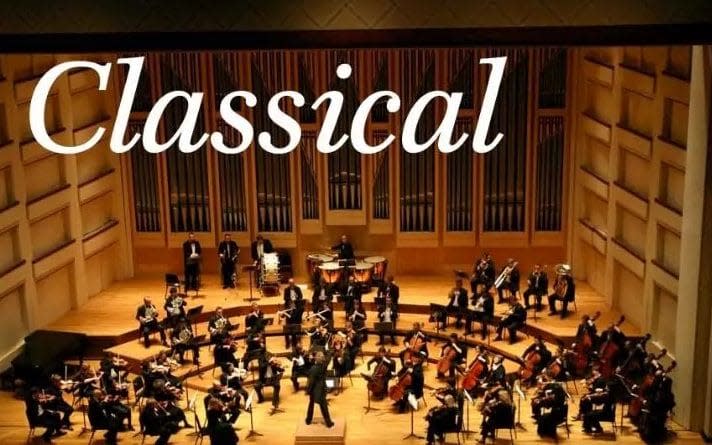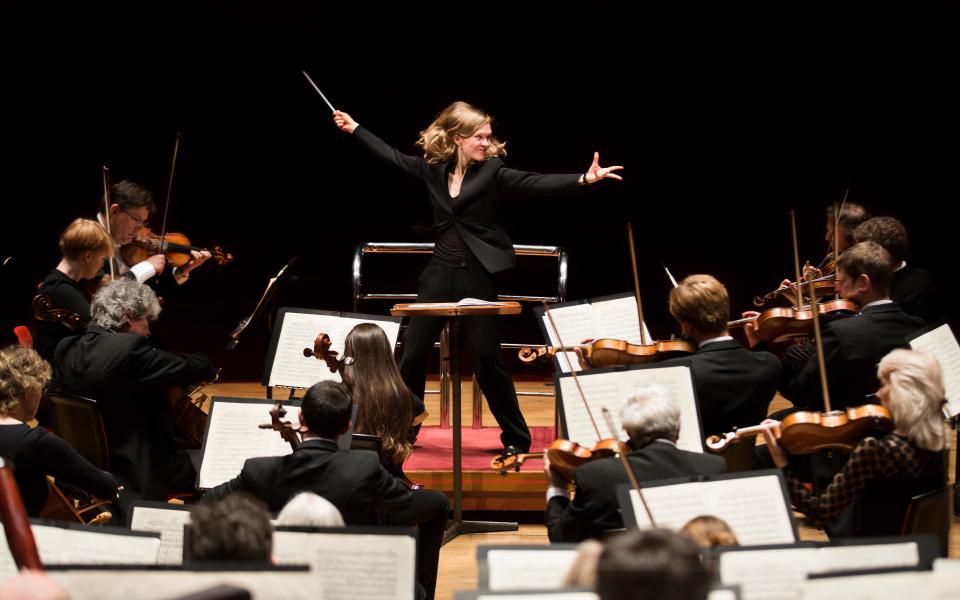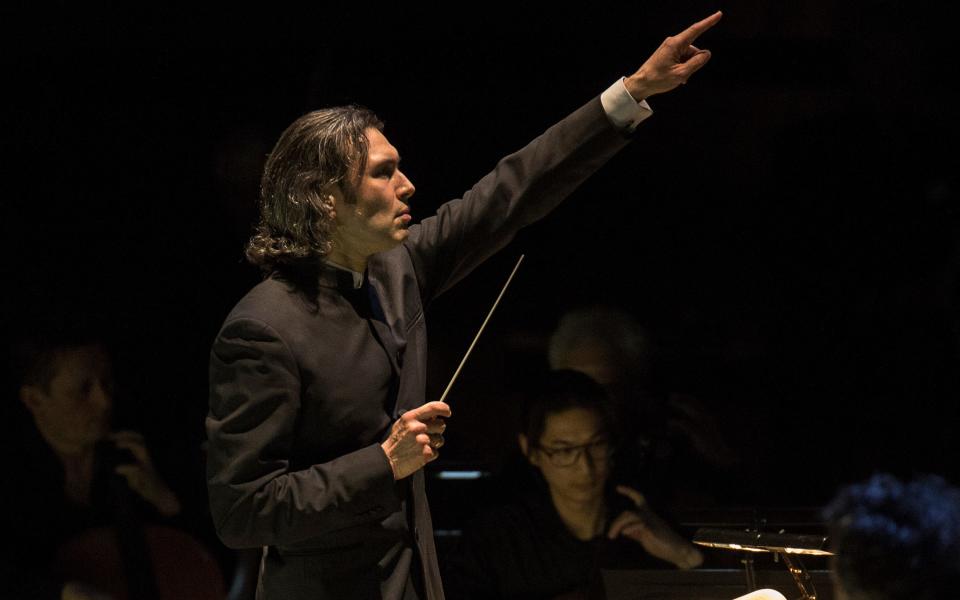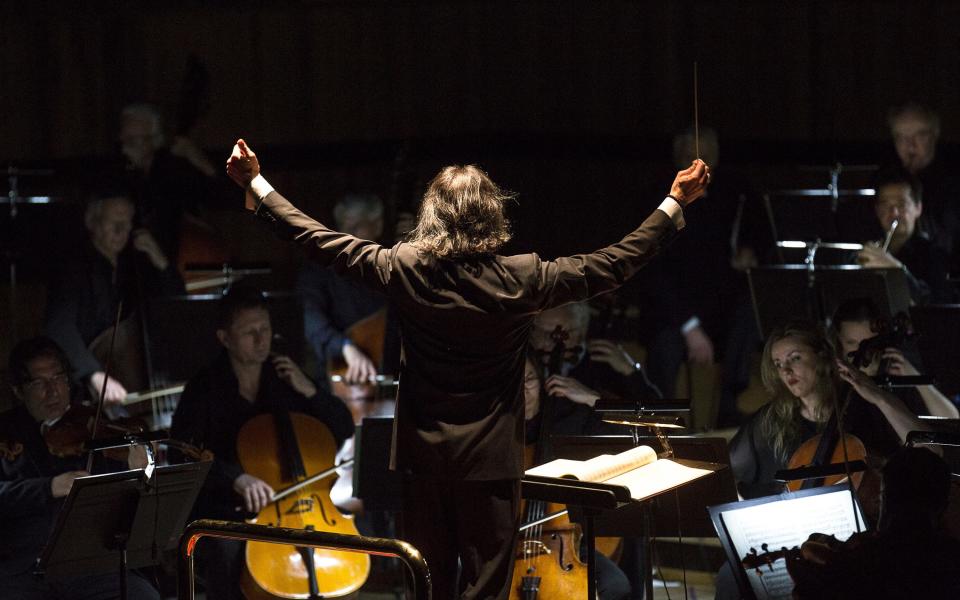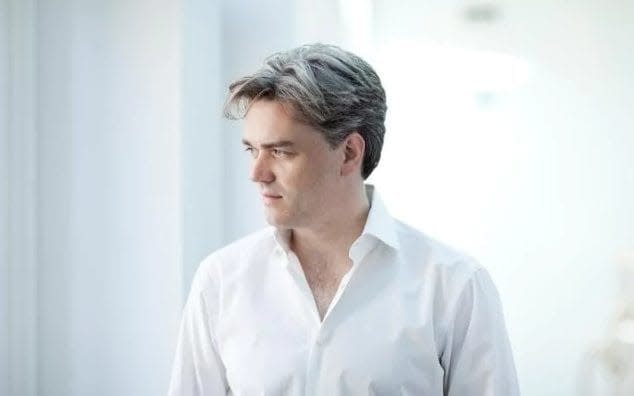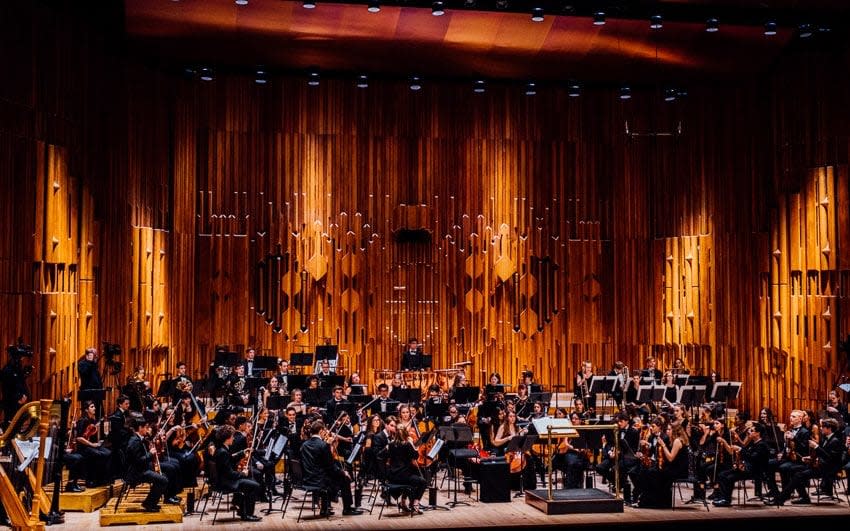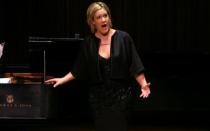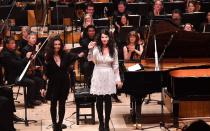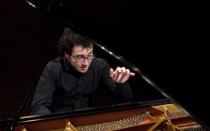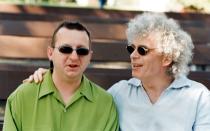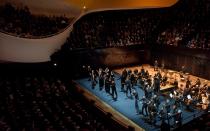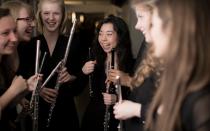Mirga Gražinytė-Tyla continues to stir up excitement, plus all January 2017's best classical concerts
We review the best classical concerts of the month
CBSO, Symphony Hall, Birmingham ★★★★☆
The excitement stirred up by young Lithuanian Mirga Gražinytė-Tyla’s appointment as Osborn Music Director of the CBSO shows no sign of abating. Symphony Hall in Birmingham was packed on a rainy Sunday afternoon for an apparently safe and unexciting all-Viennese programme.
But whoever said Haydn, Mozart and Beethoven are “safe”? Certainly not Mirga Gražinytė-Tyla, who conducted all three works as she conducts everything, ie as if her life depended on it, and in a way that made everything seem decidedly unsafe. In any case, the programme wasn’t all mainstream, even on paper. Rather than launching off with one of Haydn’s copper-bottomed late hits, she chose no 31, one of those early symphonies one hardly ever hears.
This symphony is known as the Hornsignal, for reasons which were hair-raisingly obvious from the start. In fact the CBSO’s four horn players got to shine in all four movements, and not only them; in the second movement, the 1st violin and 1st cello had their moment in the sun, and in the final variation movement there were numerous solo passages, ending with one for a double-bass. What this delightfully witty parade showed is that under Gražinytė-Tyla’s leadership the orchestra has developed a very stylish way with Haydn, responsive to his strange moments of aloofness as well as his peasant earthiness. That’s quite a feat, given she’s only been in post a few months.
Another factor that lifted this concert well beyond the ordinary was the presence of young Italian pianist Francesco Piemontesi. He gave a wonderfully winning performance of Mozart’s final piano concerto, faithful to the work’s dewdrop lucidity and gentle nostalgia, but irradiated with joie de vivre too, in the way he garlanded Mozart’s notes with stylish and witty flourishes of his own. The orchestra and Gražinytė-Tyla were alert to his every move.
Finally came Beethoven’s Fifth Symphony, that most hackneyed piece, about which there’s surely nothing more to be said. Not so, declared this intense and unsettling performance, even though not everything in Gražinytė-Tyla’s conception convinced me. The transition back from the ghostly reappearance of the Scherzo in the Finale into the triumphant main melody seemed rushed. But her way of adding little accelerations at moments where one normally expects a pulling-back was thrilling, and the idea of prefacing the symphony with Purcell’s stony March from the Funeral Music for Queen Mary made its life-affirming qualities even more blazingly evident. IH
This concert is repeated at Symphony Hall Birmingham on February 2. Tickets: 0121 780 3333
Alice Coote and Julius Drake, Wigmore Hall ★★★★☆
The vocal health of mezzo-soprano Alice Coote has been giving even her more ardent fans casue for concern recently, and I doubt her recent appearances at Covent Garden in Der Rosenkavalier will rank among her finest hours – the grinding changes of register, the lapses into wild swooping and violent alternation between crooning and growling are bad stylistic tendencies which need eradicating. But happily this solo recital, hovering around themes of insanity and identity, also showed this unique singer at her wonderful best.
The opening was not auspicious. The fashionable young American composer Nico Muhly had written her a brief song cycle drawing on poems written by “mad” John Clare and some clinical notes written by a doctor who worked in a Victorian asylum. Muhly’s music is duly frenzied and fragmentary without amounting to anything very striking: crucially, it fails to differentiate sufficiently between the “mad” poet and the “sane” doctor. Coote appeared to be sight-reading the score, and perhaps in consequence resorted to some of her worst scooping and wailing habits.
But what followed was of altogether higher quality. Dominick Argento’s expressive settings of extracts from the diaries of Virginia Woolf was commissioned in the mid 1970s for one of Coote’s guiding lights, Janet Baker, and has seldom been performed by anyone other than her. It is a fascinating work of great contrasts, from the gentle impressionism of a scene in a Roman café to a sweetly sentimental evocation of Woolf’s dead parents to the grand fervour of its final injunction to “observe perpetually”. Such emotional volatility suits Coote’s temperament electrically: the intense commitment to every syllable and nuance of the texts she sings was evident, and there was much subtle tonal colouring too.
After the interval came Schumann’s Kerner Lieder, a product of his astonishing annus mirabilis of 1840. These profoundly Romantic songs are usually a male preserve, and next week they are due for another performance by Jonas Kaufmann at the Barbican. Here they were most eloquently interpreted by Coote and her unfailingly sensitive yet never unduly recessive piano partner Julius Drake. Whether thrillingly extravert in “Wanderlied”, ecstatically impassioned in “Stille Tränen’ or warmly melancholy in “Alte Laute”, they held the audience rapt: the silence in the hall as the last note faded was something magical and even holy. RC
No further performances
Philip Glass Total Immersion, Barbican Hall ★★★★☆
The great co-founder of minimalism Philip Glass could not be present at this 80th birthday tribute, one of the BBC Symphony Orchestra’s invaluable day-long surveys of contemporary composers. But one felt the impress of his huge creative personality, reflected in a lavish programme of three concerts, a showing of his famous environmental film Koyaanisqatsi, and pre-concert talks.
One thing we learned from this ‘immersion’ is that Glass is a prolific self-borrower. The same darkly obsessive harmonic turn turned up in the lunchtime concert of Piano Études and the chamber work Glassworks, again in the Prelude to his opera Akhnaten in the evening orchestral concert, and yet again in the closing piece Itaipú, a huge setting for chorus and orchestra of native South American texts.
More surprising was the way the later works we heard constantly borrowed from older music, not always in a good way. In Itaipú there were sinuous flute arabesques that could have come straight out of Bizet’s Pearl Fishers, and the oom-pah-pah bass drum and cymbals in his recent Double Piano Concerto sounded like a Donizetti opera overture. This concerto marked the nadir of the day. The two soloists Katia and Marielle Labèque flung themselves into the music’s tumultuous heroics, as did the orchestra under Marin Alsop’s urgent direction. But the sheer emptiness of the gestures was painful.
Well of course, the confirmed Glass-hater will say. Blank empty gestures, endlessly repeated, are Glass’s stock-in-trade. And yet scattered through the day’s events were many reminders that Glass’s way of giving an odd twist to the basic building blocks of music can yield something fascinating. The notorious counting-number choruses from Einstein on the Beach, brilliantly sung by the BBC Singers, and the alternately calm and frenzied patterns of Glassworks, played with heroic concentration by musicians from the Guildhall School, proved that point eloquently. And the performance of Itaipú showed that, when projected onto a large canvas, Glass’s method can yield something truly grand. IH
Hear the Philip Glass Total Immersion Day on the BBC iPlayer www.bbc.co.uk/radio3
LPO/Jurowski, Royal Festival Hall ★★★★★
The second concert of the London Philharmonic’s “Belief and Beyond Belief” festival – a year-long exploration of spirituality in music and wider culture – took us to a realm where anyone’s belief would be sorely tested. The centrepiece was Bohuslav Martinů’s Memorial to Lidice, composed during the Second World War in response to the Nazi destruction of an entire Bohemian village. In one of his most compact works, the exiled composer summons up sorrowful nobility rather than fist-shaking anger – a spiritual reaction if ever there was.
Martinů, the last of music’s four great Czech masters, is all too seldom played by London’s orchestras, so this was a welcome performance. Under Vladimir Jurowski’s baton, the LPO brought out the warm sonorities of a score that is built on fragments the old St Wenceslas Chorale, a prayer for protection. A brief quote of the motto theme from the opening of Beethoven’s Fifth Symphony, adopted by the BBC as a wartime signal, sounds a note of defiance, but the overall tone is of lamentation.
All three works on this fascinating programme were elegiac, by composers all closely identified with their respective national traditions. Giya Kancheli’s Mourned by the Wind is not a political piece, despite the Georgian composer (who received an ovation here in the Festival Hall) having written it during the last years of the Soviet Union. Subtitled “Liturgy in memory of Givi Ordzhonikidze for orchestra and solo viola”, it commemorates a musicologist friend in terms that have nothing to do with the virtuoso concerto tradition. Once the crashing piano chord of the opening dies away, it is answered by the viola oscillating between two notes, numbed with grief.
As played by Isabelle van Keulen, the slowly climbing viola sang with eloquent warmth. Jurowski was at his wizard-like best, conducting with conviction and ensuring that the powerful outbursts that punctuate this soundscape registered fully without derailing the viola from its essentially calm course.
The elegy that forms the slow movement of Vaughan Williams’s Ninth Symphony was originally connected in the composer’s mind with the death of Tess of the d’Urbervilles. Eventually, it was absorbed into what the celebrated critic and musicologist Michael Kennedy called the “most individual and enigmatic” of the composer’s nine symphonies. Steering this visionary work from the massive striving of its opening via sardonic episodes towards its flowing apotheosis, and revelling in the unusual colours that include a fruity flugelhorn and saxophone trio, this was vintage Jurowski. But then, only Jurowski could have found a way of putting Kancheli, Martinů and Vaughan Williams together in one programme. JA
More concerts in this series: lpo.org.uk/belief
Luca Buratto, Wigmore Hall ★★★★☆
Luca Buratto, 23-year-old laureate of the 2015 Honens Piano Competition, is no ordinary virtuoso. The programme booklet for this Wigmore Hall recital told us that he’s interested in physics and postmodern literature. And lest that seem a mite pretentious, we also learned that he likes jigsaw puzzles and table-tennis, and hours before winning the prize was inspired by tennis ace Roberta Vinci’s surprise win over Serena Williams at the US Open.
So, a playful intellectual with nerves of steel was what we expected: the recital confirmed all that, and more. Buratto began with a beautifully poised performance of John Dowland’s famous lute piece the Lachrimae Pavan, as arranged for keyboard by William Byrd. He made the rich tangle of lines seem perfectly lucid, and never allowed Byrd’s added luxuriance to compromise the music’s melancholy austerity.
It was a clever move to follow this with Thomas Adès’s Darknesse Visible, which the composer described as an “explosion” of Dowland’s song In Darknesse let me dwell. The shards from this explosion glittered mysteriously under Buratto’s hands, and he gave the muffled outlines of Dowland’s original a mysterious sombre quality, like “darkness visible” in sound.
A gift for summoning different shades of colour – not just one after another but simultaneously – is clearly one of Buratto’s great gifts. It was audible in another piece by Adès, Traced Overhead, where Buratto made the music’s overlapping layers uncannily clear, with slow descending lines of adamantine hardness set against flurries of almost-inaudible feathery notes.
But there’s more to Buratto than a brilliant colourist. He can give a long formal arch a sense of massive conviction, as he showed in the slow movement of Beethoven’s Appassionata sonata. And in the finale of the same sonata, the young man who thrilled to Roberta Vinci’s victory suddenly revealed himself. Buratto launched off into the closing bars with what seemed like reckless abandon, but he never lost control. The same was true of the triumphant march in Schumann’s Fantasie, where he again tempted fate by taking the last few bars at a madly fast pace, and won game set and match.
The most striking moment came at the very end of Schumann’s piece. Most pianists make the sound die away in the final bars, but Buratto swelled the tone mightily. It shed a different light on a familiar piece, and made one think that alongside the risk-taker and brilliant colourist there lurks a poet. IH
Luca Buratto’s album Live at Honens is available on the Honens label. Details: lucaburattopiano.com
LSO / Simon Rattle, Barbican ★★★★★
No doubt about it; when Sir Simon Rattle stands in front of the LSO, something special happens. It’s not just a matter of blazing nerve-jangling intensity. It’s also the way rhythms are spot-on, without being punctiliously hard-edged, and also the way he gives space for the players’ individuality to shine out. This trait has surely been encouraged by Rattle’s years at the helm of the Berlin Philharmonic, that orchestra he’s variously described as "a brilliant bunch of soloists" and "stroppy buggers".
All those traits were on jaw-dropping display at this brilliant and moving concert. It began with ‘Remembering’, a piece written by 50-something British composer Mark-Anthony Turnage to commemorate the tragically early death of Evan Scofield, the gifted son of jazz guitarist John Scofield. A symphony in all but name, it launched off with a dancing energetic first movement, too harmonically dark to be pure American pastoral, too rhythmically edgy to ‘swing’, but with hints of both. The piece that followed had a similarly suggestive ambiguity, with protesting laments in the winds alongside a solemn processional.
By the time we were into the third movement, a darting scherzo which turned into a brass chorale at the mid-point, things had become clear. The music was trying to deny Evan Scofield’s untimely death, by evoking him in life. One felt his energising presence, in those incessant dancing rhythms. At the same time, the chorales and processionals accepted his parting, though under protest. Finally, in the very beautiful closing movement, the piece bade farewell in a spirit of tender acceptance, with solo viola and cello and soprano saxophone entangled in mournful lament.
After that memorial, moving in its understatement, the self-aggrandising noisiness of Mahler’s Sixth Symphony came as a jolt. But one soon accustomed oneself to the change, as the performance from Rattle and the orchestra was so richly varied and subtle. It was subtle not in the sense of being muted and understated – that would be impossible – but in the way the music’s dark corners seemed even more dark, and the sudden changes of emotional colour truly startling, to a degree where they seemed modern and surreal rather than hyper-romantic.
It was tremendous, but the LSO should watch out. The arrival of Sir Simon as Music Director in the Autumn ought to be a great event. If there are more concerts like this before then, they might steal their own thunder. IH
Les Arts Florissants, Wigmore Hall ★★★★★
'Ardo” (I burn). That was the arresting first word in this evening of lovers’ complaints and joys, sung by a group of six singers from the French group Les Arts Florissants. Then came a tiny pause, then the punch line: “ma io non ti amo” (but I don’t love you). We soon learned why: the lady had abandoned the lover, so he was now burning with indignation.
That was just for starters. Over the next two hours we had joyful lovers, abandoned lovers, lovers comparing their lovers’ eyes to stars in the sky, lovers “dying” after “sweet parting” – a euphemism for something very down-to-earth. They all came from many-voiced songs or madrigals written by Italian composers around the turn of the 17th century.
There was a time when this music was sung with decorous English beauty, often by full choirs. Not any more. Younger Italian groups have taught us that what counts in this music is the words. These six singers, four of them English, showed they had taken this lesson to heart. They made the music bend to the words, pausing when the poem talked about “dying”, drooping when it lamented, speeding up when the poet got furious or desperate over his lady’s coldness. Their sound wasn’t always beautiful. In fact, when the protests of love or sorrow came tumbling over each other in a frenzy, the sound almost became ugly – but in a good way.
The danger with this music for modern ears is that it can seem too intense, too much of the time. Director Paul Agnew cleverly avoided this by putting different settings of the same poem together, so we could enjoy the competitive element in the musical culture of that time. Monteverdi was the stand-out name, but he was surrounded by almost equally talented figures, and as the concert proved he didn’t always win the battle.
There was also plenty of variety of tone. Giaches de Wert’s madrigal “Vessozi Augelli” was a lovely rural interlude, imitating rustling leaves and twittering birds. Marenzio’s exquisite four-part madrigal “Non vidi mai dopo notturna pioggia” showed that the singers could summon an immaculate, perfectly tuned harmony. In Monteverdi’s “Se tu mi lassi, perfida, tuo danno” (If you leave me, faithless one), the group even managed to summon up a disillusioned tone for the last line, where the abandoned lover realises he was never really loved in the first place. Artistry at that level really does seem magical. IH
Les Arts Florissants’ recordings of Monteverdi Madrigals vols 1 & 2 are available now on Les Arts Florissants Editions
Bergen Philharmonic/Gardner, Saffron Hall ★★★★☆
Launching its week-long British tour in Saffron Walden under rainy skies, the Bergen Philharmonic Orchestra must have felt quite at home. But taking no chances with acclimatisation, it also brought something from home to open the concert, the Suite No 1 from Grieg’s Peer Gynt. Though this orchestra could be forgiven for sounding jaded when it comes to the work of Bergen’s most famous musical son, there was no hint of that: this was its first tour here with Edward Gardner as chief conductor, and he approached this music with fresh ears.
The four short movements proved an ideal vehicle for displaying the orchestra’s unique qualities. Founded 252 years ago, this venerable band has a natural culture of warmth in its playing, and the delicacy of the first three pieces was beautifully projected in sound of great depth. For the finale, In the Hall of the Mountain King, Gardner kept the players on a tight leash: his steady tempo ensured that the music packed extra punch.
A very different sort of showpiece, Bartók’s Concerto for Orchestra put the players through more extreme paces. But Gardner was consistent in maintaining musical tension, which translated here into brilliant, even ferocious energy. Composed in 1943 in a New York hospital bed, the music speaks of personal as well as political turmoil, and this searing performance addressed all its aspects. Gardner’s fluid baton meant that the mysterious opening, with mournfully muted trumpets, emerged just as grippingly as the more obvious, grotesque moments, and the big folk tune of the fourth movement swept along. Bartók spotlights (often in pairs) all the orchestra’s instruments, making this indeed a concerto for everyone – and everyone in Bergen’s team shone.
The concert’s temperature dropped a little in the middle, when the orchestra was joined by Leonard Elschenbroich for Elgar’s Cello Concerto. Contrary to what some seem to feel, this autumnal masterpiece can withstand many different interpretations, but the problem was that Elschenbroich didn’t seem to have any point of view. Nearly derailing himself in the scurrying second movement, he certainly mimed an impassioned performance, but little of that actually came across in his slender tone. If the most moving Elgar of the concert turned out to be the orchestra’s encore, Nimrod, Elschenbroich’s own encore was a redeeming feature: anyone who plays early Hindemith still gets my vote. JA
The Bergen Philharmonic tour continues to Birmingham (Symphony Hall, January 17), Basingstoke (The Anvil, January 18), Sheffield (City Hall, January 19) and London (Cadogan Hall, January 20)
BBC Philharmonic/Collon at Bridgewater Hall, Manchester ★★★★☆
It would be hard to ask much more of an orchestral concert than the BBC Philharmonic’s offering of three orchestrations of Ravel piano works (one a world premiere), his Piano Concerto for Left Hand with a world-leading exponent of French repertoire, and finally one of the most colossal of all symphonies, all under the baton of a rising-star British conductor.
Shostakovich’s wartime Eighth Symphony is – or at least should be - a terrifying experience. Its first movement alone is a drama of extreme violence, and the two following Scherzos are scarcely less traumatic. The slow movement drains sorrow to the very dregs, and the finale attempts reconstruction and even a wan playfulness, but still has to confront demons before ending with a faint chink of hope.
Nicholas Collon may have to put up with the “young conductor” label for a while yet. But he had all the maturity, understanding and authority to keep this symphonic juggernaut on track. Not for him the kind of Soviet-style hysteria that has the percussion approaching the pain threshold and the brass stripping the paint off the ceiling. In fact, the trumpets might have been allowed a little more blare to the benefit of the dramatic high-points. But in compensation, the structure was paced and shaped to near-ideal effect, and the hushed nerve-centre of the lamenting slow movement had the Bridgewater Hall audience hanging on every note.
Collon was also equal to the very different challenge of the Ravel orchestrations, where he had to blend the fastidiously applied colours of an even larger orchestra. The trouble with orchestrating Ravel is that while the originals magically make the piano sound not like a piano, even the deftest of scoring can’t really make an orchestra not sound like an orchestra. Even so, the timbral imagination and sheer professionalism Colin Matthews and Steven Stucky brought to the three pieces from Miroirsthat Ravel himself did not orchestrate were absorbing in their own right.
Back with Ravel’s own colouristic palette, the Piano Concerto for the Left Hand found Jean-Efflam Bavouzet at his most idiomatically assured, both in the improvisatory opulence of the opening sections and in the panache and swagger of the central scherzo. Power was never a problem, and nor was precision. Here, too, the orchestra was not to be outdone, and the principal trombone’s bow was especially well earned for his idiomatically spot-on jazzing. David Fanning
The concert is available for 30 days via Radio 3 website and downloadable via BBC iPlayer Radio app
Cello Unwrapped, Kings Place, London ★★★★☆
Where to start with a year-long survey of an instrument, when the possibilities of its solo, ensemble and concerto repertoire are among the richest in music? This year's thematic focus at Kings Place is Cello Unwrapped — following previous explorations of single composers and seminal movements in musical history — and to launch it that outstanding German cellist Alban Gerhardt tellingly chose the opening of Britten's Cello Suite No. 1.
One of Britten's remarkable series of works written for Mstislav Rostropovich, it looks back to Bach yet sounds of its time (1965). Playing just its brief first movement, the "Canto primo", Gerhardt dug right in with his characteristically rich-toned, questing style. It asked a question that was seemingly answered when Gerhardt and the Aurora Orchestra (already gathered on stage around him) segued into Vivaldi's Cello Concerto in B minor, RV424.
Dating from just a decade or so after Gerhardt's own cello, a 1710 Gofriller, the Vivaldi proved exhilarating, showing off the soloist's singing upper register and his virtuosity. In close ensemble, Gerhardt inspired the Aurora musicians to their finest playing of the evening.
Not that there was anything lacking in their performance of Tchaikovsky's Rococo Variations, where under Nicholas Collon the orchestra was responsive to the music's rhetorical aspects. Delivering the opening theme with an intensity that touched on all its possibilities, Gerhardt delved deep in a very physical performance, so much so that during the cadenza his bottom string broke — though not the concentration, thanks to a quick switch of instruments from the orchestra's cello section.
In a generous encore, Gerhardt and the orchestra (winds and lower strings) played Wilhelm Fitzenhagen's Resignation, making a neat connection of Fitzenhagen's role as dedicatee (and re-arranger) of Tchaikovsky's work. On their own, the Auroras reflected other neo-classical connections with Ravel's Le tombeau de Couperin and Stravinsky's Pulcinella Suite. But "Baby Rattle" Collon is a fine conductor, and ought to have enough self-belief now to drop the copycat Simon Rattle mannerisms.
The real unwrapping of the cello arrived with the late-night concert devoted to Kodály's Sonata for Solo Cello, one of the masterpieces of the repertoire. A wartime work dating from 1915, it is sombre yet speaks of unbroken Hungarian traditions — in its middle movement a gypsy band seems to collide with a swarm of insects on the Hungarian plain. Gerhardt gave his all to a score that has everything you could wish for on the cello. JA
London Schools Symphony Orchestra, Barbican, London ★★★★☆ / The National Youth Orchestra of Great Britain, Symphony Hall, Birmingham ★★★★☆
Last week brought concerts from two of our wonderful youth orchestras, the National Youth Orchestra of Great Britain, and the London Schools Symphony Orchestra. The latter is not so well known as its senior cousin but deserves plaudits no less. The players are drawn from across London’s school system by audition, and simply assembling everyone for rehearsals is a triumph of persuasion and cajoling on the part of the organisation, as it has to compete with all the other demands on the children’s time.
Given that fact, the concert by the LSSO at the Barbican on Thursday had a touch of the miraculous. They tackled a programme that in some ways was even more taxing than the one played by the NYO the following day, and certainly a lot darker. It contained three Russian works from the Soviet era, including Schnittke’s Viola Concerto, a piece that mingles the composer’s intimations of his own mortal illness with the spiritual deracination of the dying days of the Soviet Union. Soloist Lawrence Power summoned a truly desperate intensity, flinging protesting volleys of notes against the orchestra’s tread, played with implacable heaviness by the young players under Sian Edwards.
After the interval came Shostakovich’s tragic Fifth Symphony. What could these young players have made of the overwhelming sorrow of this music, issuing from the dark time of Stalinism that to them must seem like ancient history? Quite a lot, was the answer given by the performance. The violins etched the haunted high lines of the slow movement with admirable control, and the final movement hit the right tone of grim-faced triumph.
Compared to that, the NYO’s concert at Birmingham’s Symphony Hall on Friday seemed almost light, though it wasn’t without moments of mystery. One of them came at the very beginning, when sounds of arresting uncanniness from percussion mingled with more familiar harmonies in wind and brass. This turned out to be Suspended Between Earth and Air by Lauren Marshall, one of the NYO’s resident composers, which was dropped into the programme unannounced.
There were more moments of dark brilliance in Australian composer Brett Dean’s Komarov’s Fall, an evocation of a doomed Soviet space mission, and in Karol Szymanowski’s Symphony No 4. The symphony’s prominent piano part was played by Serbian virtuoso Tamara Stefanovich, who found just the right sinuous exoticism for the slow movement and stamping peasant vigour for the finale. Her brief duets with orchestral leader Leora Cohen were a particular delight.
Then came a surgingly intense performance of Rachmaninov’s 2nd Symphony, conductor John Wilson urging the players to be always just ahead of the beat, as if the music could hardly contain its own passion.
We hear much about fine youth orchestras overseas, but as these two concerts reminded us, we have much to be proud of back home. IH
Hear the National Youth Orchestra’s concert on the BBC iPlayer: www.bbc.co.uk/radio3

 Yahoo Sport
Yahoo Sport 





































